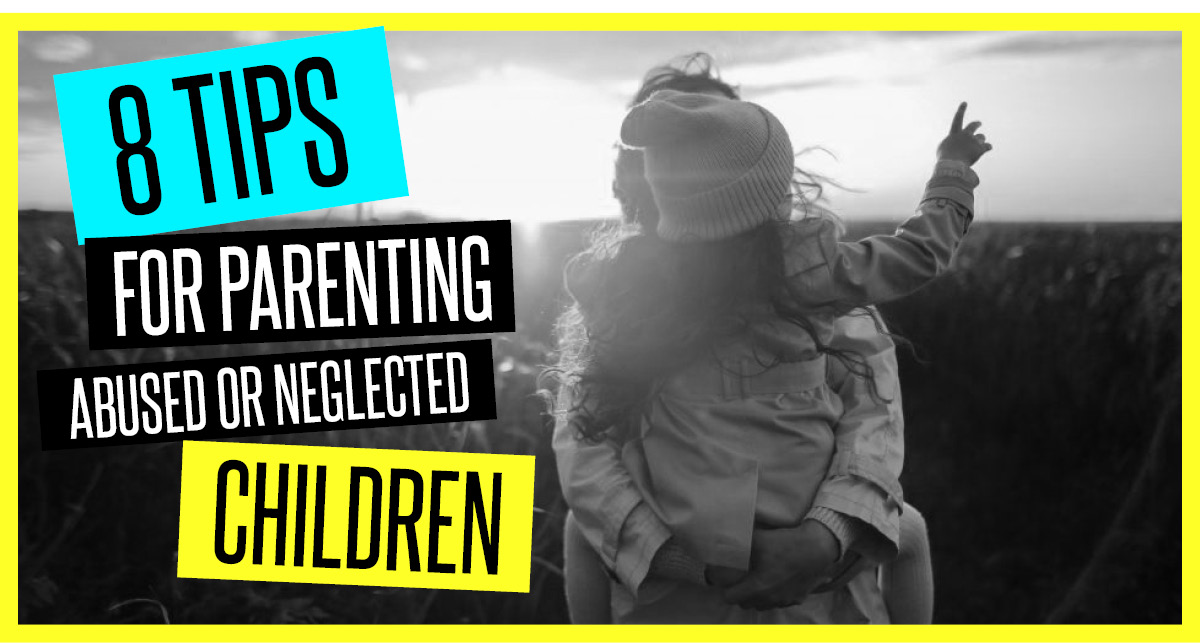
8 Tips for Parenting Abused or Neglected Children
Parenting comes with many challenges. Whether dealing with temper tantrums, adolescent angst, or teen rebellion, it’s hard work that can often have you second-guessing your efforts. Parenting a child who’s been abused or neglected (birth, foster, or adopted) can add to the challenge of parenting.
The Effects of Child Abuse and Neglect
The first step is understanding the effects of child maltreatment. From the moment a child is born, their brains adapt and evolve based on their experiences. When children are exposed to trauma, neglect, or thrust into a world of chronic stress, the brain develops strategies to cope, focusing on self-preservation. A large part of their coping mechanism is learning to identify the next potential threat. Over time, those skills become behaviors, which can continue even after the dangers are gone, and a child is in a safe and nurturing environment.
Child abuse can leave physical and emotional scars and cause trauma and toxic stress, which can be caused by several situations. Toxic stress— intense, frequent, or ongoing adversity, including physical or emotional abuse, chronic neglect, caregiver substance use or mental illness, or exposure to violence—can be responsible for various reactions. Some children may be reluctant to trust, others may act out, and some may withdraw from family and friends.
The Healing Process
Healing can be a long and frustrating journey but can be accomplished by nurturing your child’s ability to develop resilience to help them heal and thrive. When children develop resilience, they can thrive despite their adverse circumstances. The path may be full of twists and turns and may even have land-mines along the way, but several tips can help you parent an abused or neglected child:
1. Model a positive outlook. Parents are a child’s best role model. Show children that when problems arise, they won’t last forever, and things will get better. Your actions in those situations help children learn how to work through tough situations.
2. Try to understand behaviors before punishing. Maltreated children react or act out based on the abuse or neglect they suffered. The more you can learn about the causes of these behaviors—attachment problems, bonding, and development— the more you will develop useful interventions. For example, a child who experienced hunger may hoard food. Accusing them of stealing and punishing them may cause the child to feel insecure and exacerbate their need to stockpile food.
3. Listen to and talk with children. Life can be hectic for any family, but when you have the chance, sit, listen, and play with your children. Quietly interacting with them will make them feel safe, and they often will open up.
These moments are a good time to teach children about their feelings. Use these principles:
- All feelings (sad, glad, mad, etc.) are okay to feel. Let them know that their feelings are validated.
- Help them understand healthy ways to act on those feelings (sad, glad, or mad)
- Let them know that other people feel and show feelings—“How do you think Bobby feels when you push him?”
- When you sense that the child is happy, sad, or mad, ask them how they feel to help them learn how to describe their feelings.
4. Have realistic expectations. Abused and neglected children have a lot to overcome, and healing takes time. There’s no timeline to predict when a child will feel safe or trust. Don’t hesitate to get help from a qualified professional to help you, your child, and your family.
5. Be patient. Progress will be slow and frustrating. You may feel inadequate because all the love, time, and effort you exert on your child’s behalf may not seem to work. Every situation is different, and there isn’t a one-size-fits-all solution. But it does work. It just takes time.
6. Help your child build confidence. The attention many maltreated children receive is negative. Let your child or youth know when they do something well, such as demonstrating kindness or honesty. Praising your child has a tremendously positive affect.
7. Express your support. For many children that suffer abuse and neglect, support is withheld. Demonstrate love, empathy, and support verbally and physically. Your actions may be rejected, but they do have an impact.
8. Demonstrate a pattern of consistency. Many abused and neglected children have not been able to rely on parents or adults. If you say you’ll be there, make sure you stick to your promise. If you say you’ll listen to concerns, listen. Knowing they can count on you will help teach your child or youth that people can be trusted.
Get the Help You Need
Dealing with the effects of maltreatment can be daunting. Professional help and support groups can provide you and your family with skills and strategies to build healthy relationships, overcome past trauma, and prevent reoccurring or future trauma. A therapist best suited to assist with parenting children and youth who have experienced abuse or neglect should:
- Be trained and knowledgeable about the impact of trauma on children, youth, and families.
- Allow and encourage your participation in treatment.
Support is also available through EndCan’s survivor community. We recently launched the Louder than Silence: Ending Child Abuse and Neglect Survivor Community through Inspire. Inspire is a free, online community of support groups where people exploring health conditions can feel safe, be authentic, anonymously discuss their experiences, and learn from other people who have “been there.” Anonymously ask questions about your experiences with child abuse and neglect, get support from other survivors, and join us in the movement to create a world safer for future generations. You can join our survivor community today at https://www.inspire.com/groups/prevent-child-abuse/.
